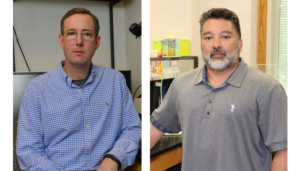 The CMT Research Foundation is pleased to announce a new research program to develop a precision medicine approach for Charcot-Marie-Tooth (CMT) disease. Precision medicine is a medical model that considers the differences between individuals within a specific subgroup of patients to customize drug development and treatment strategies, instead of developing drugs for the “average patient” with a one‐drug‐fits‐all model. The research will be carried out by Dr. Chris Lorson and Dr. Michael Garcia of the University of Missouri.
The CMT Research Foundation is pleased to announce a new research program to develop a precision medicine approach for Charcot-Marie-Tooth (CMT) disease. Precision medicine is a medical model that considers the differences between individuals within a specific subgroup of patients to customize drug development and treatment strategies, instead of developing drugs for the “average patient” with a one‐drug‐fits‐all model. The research will be carried out by Dr. Chris Lorson and Dr. Michael Garcia of the University of Missouri.
While gene therapy holds tremendous promise for people with CMT, it won’t be enough to simply remove mutated genes for patients with some forms, like CMT2E. In people with CMT2E, a mutation of the neurofilament light gene (NEFL) causes an abnormal neurofilament light protein (NfL). These patients may require a treatment that replaces their dysfunctional gene with a normal gene that produces a normal protein as well.
In this research project, Drs. Lorson and Garcia will develop and test a new gene therapy approach that will both silence the abnormal gene and simultaneously replace it with genetic material that will produce normal protein. The research team will test this approach in an animal model of CMT2E that is already well understood, making it suitable for this proof-of-concept project. If the approach is successful, it could potentially be used for other forms of CMT as well. In fact, it is possible this approach could be used for many CMT-causing mutations that require both silencing of a mutated gene and replacement with normal protein — whether the mutation is currently known or has yet to be discovered. The ability to silence and replace genes, regardless of the specific mutation, is what makes this a precision medicine approach.
Like the CMT Research Foundation, the research team at the University of Missouri is focused on delivering safe and effective treatments as rapidly as possible. While these initial studies will be carried out in mice, the project will use genetic material from humans and a delivery vehicle that is already used in FDA-approved genetic therapies. Furthermore, the research team of Drs. Lorson and Garcia brings extensive and complementary expertise to the table. Dr. Garcia, a CMT researcher for more than 15 years, has developed important animal models of CMT that have provided insight into the role of NfL during disease development, thereby illuminating the biological context for therapeutic testing. Dr. Lorson’s research has focused on molecular genetics and its therapeutic applications, including addressing the molecular mechanism that was key to development of an FDA-approved genetic therapy for spinal muscular atrophy (SMA). Together, this team represents a unique blend of experience in fundamental biology and “bench-to-bedside” science.
Learn more about the CMT Research Foundation’s research priorities and see all the research we’re currently funding.

